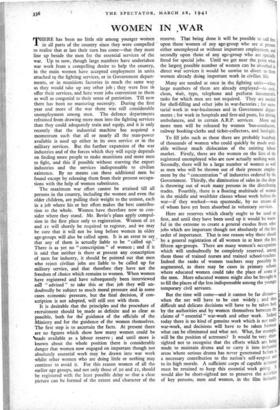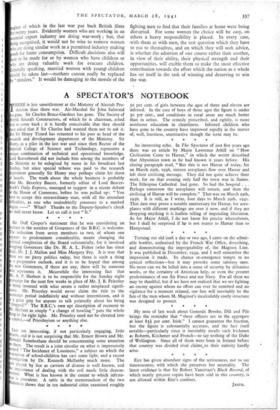WOMEN IN ,WAR
THERE has been no little stir among younger women in all parts of the country since they were compelled to realise that at last their turn has come—that they must line up beside the men for the essential services of the war. Up to now, though large numbers have undertaken war work from a compelling desire to help the country, in the main women have accepted employment in units attached to the fighting services, or in Government depart- ments, or in munitions factories in much the same way as they would take up any other job ; they were free to offer their services, and here were jobs convenient to them as well as congenial to their sense of patriotism. Till now there has been no mastering necessity. During the first year and more of the war there was still considerable unemployment among men. The defence departments refrained from drawing more men into the fighting services than they could adequately train and equip, and it is only recently that the industrial machine has acquired a momentum such that all or nearly all the man-power available is used up either in its own service or in the military services. But the further expansion of the war industries and of the forces which they will equip depends on finding more people to make munitions and more men to fight, and this if possible without starving the export industries and the services indispensable to civilian existence. By no means can these additional men be found except by releasing them from their present occupa- tions with the help of women substitutes.
The maximum war effort cannot be attained -till all persons in the country, including the women and even the older children, are pulling their weight to the utmost, each in a job where his or her effort makes the best contribu- tion to the whole. Women have therefore now to con- sider where they stand. Mr. Bevin's plans apply compul- sion in the first place only to registration. Women of 20 and 21 will shortly be required to register, and we may be sure that it will not be long before women in older age-groups will also be called upon. It is an error to say _ that any of them is actually liable to be " called up." There is as yet no " conscription " of women ; and if it is said that neither is there at present any conscription of men for industry, it should be pointed out that men who reject civilian jobs are liable to be called up for military service, and that therefore they have not the freedom of choice which remains to women. When women have registered and have subsequently been interviewed anZ " advised " to take this or that job they will un- doubtedly be subject to much moral pressure and in some cases economic pressure, but the final decision, if con- scription is not adopted, will still rest with them.
It is desirable that the principles and the procedure of recruitment should be made as definite and as clear as possible, both for the guidance of the officials of the Ministry and for the guidance of the women themselves. The first step is to ascertain the facts. At present there are no figures which show how many women could be made available as a labour reserve ; and until more is known about the whole position there is considerable danger that women now engaged on important though not absolutely essential work may be drawn into war work whilst other women who are doing little or nothing may continue to avoid it. For this reason women of all the earlier age groups, and not only those of 20 and 21, should be registered with the least possible delay so that a clear picture can be formed of the extent and character of the reserve. That being done it will be possible to call first upon those women of any age-group who are at present either unemployed or without important employment, and secondly upon those of any age-group who are specially fitted for special jobs. Until we get near the. point when the largest possible number of women can be absorbed in direct war services it would be unwise to divert to them women already doing important work in civilian life.
Many are needed at once in the fighting units—where large numbers of them are already employed—to cook, , clean, Wait, type, telephone and perform innumerable tasks for which men are not required. They are needed for shell-filling and other jobs in war-factories ; for secre- tarial work in war-businesses and in Government depart- ments ; for work in hospitals and first-aid posts, for driving ambulances, and in certain A.R.P. services. More and more men will be released by women 'bus-conductors. railway booking-clerks and ticket-collectors, and land-girls.
To fill jobs such as these there are probably hundreds of thousands of women who could quickly be made avail- able without much dislocation of the existing labour market. Firstly, there are the women on the lists of the registered unemployed who are now actually seeking work. Secondly, there will be a large number of women as well as men who will be thrown out of their present employ- ment by the " concentration " of industries ordered by the Government. Thirdly, the diminution of sales in the shops is throwing out of wcrk many persons in the distributing trades. Fourthly, there is a floating multitude of women in the middle and wealthier classes whose work before the war—if they worked—was spasmodic, by no means all of whom have yet been absorbed in voluntary services.
Here are reserves which clearly ought to be used up first, and until they have been used up it would be waste- ful in the extreme to create a general exodus from other jobs which are important though not absolutely of the first order of importance. That is one reason why there should be a general registration of all women in at least the first fifteen age-groups. There are many women's occupations which will undoubtedly be completely reserved, among them those of trained nurses and trained school-teachers. Indeed the ranks of women teachers may possibly be augmented, as there may be cases in primary schools where educated women could take the place of some of the men. More educated women might also be brought in to fill the places of the less indispensable among the younger temporary civil servants.
But the time will come—and it cannot be far distant— when the net will have to be cast widely ; and then difficult and delicate decisions will have to be taken both by the authorities and by women themselves between the claims of " essential " war-work and other work. Indeed today there is no kind of genuine work which is not really war-work, and decisions will have to be taken between what can be eliminated and what not. What, for example will be the position of actresses? It would be very short- sighted not to recognise that the efforts which are being made to maintain drama and to carry it into industrial I areas 'where serious drama has never penetrated before s a necessary contribution to the nation's self-respect and to its high morale. A sufficient corps of capable actresses must be retained to keep this essential work going. It would also be short-sighted not to preserve the activiues of key persons, men and women, in the film industt)i egiect of which in the last war put back British films or twenty years. Evidently women who are working in an senrial export industry are doing war-work ; but, that g recognised, it would not: be wise to remove women ho are doing similar work in a permitted industry making oods for home consumption. Difficult decisions also will ye to be made for or by women who have children or ho are doing valuable work for evacuee children. nerally speaking, married women with young. children ould be taken last—mothers cannot , really be replaced y " minders." It would be damaging t'o the morale of the fighting men to find that their families at home were being disrupted. For some women the choice will be easy, on others a heavy responsibility is placed. In every case, with them as with men, the test question which they have to put to themselves, and on which they will seek advice, is whether the adoption of one course rather than another, in view of their ability, their physical strength and their opportunities, will enable them to make the most effective contribution towards the effort which the nation as a whole has set itself in the task of winning and deserving to win the war.































 Previous page
Previous page